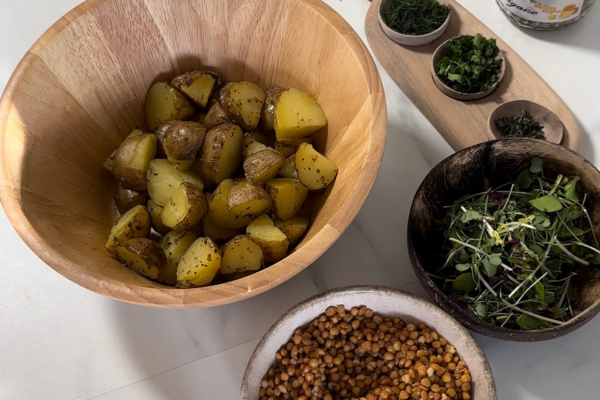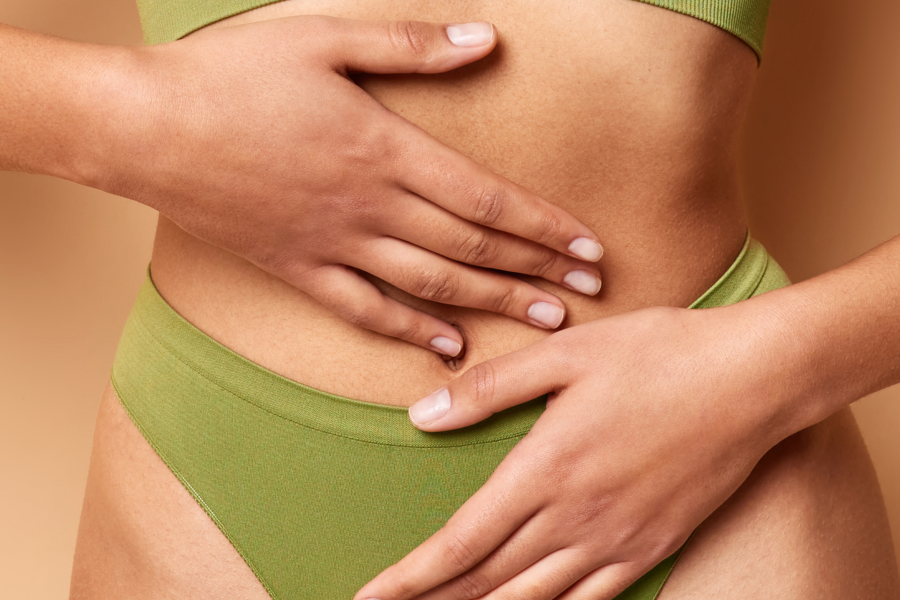Guest writer: Hanna Rose
Mastering the art of nourishing our bodies can be tricky. Throw in your period and cycle changes, and it may seem impossible.
Our gut microbes are full of incredible health-modifying potential. They do this by producing compounds that travel up the vagus nerve and influence our brain activity.
So what helps drive this process? Our diet, which is also our microbes’ diet.
The non-starchy fibres found in plants may be indigestible to us, but our microscopic friends take care of that. They ferment these fibres for us and in process they release compounds that directly or indirectly act on the brain, resulting in improved appetite regulation, increases in GABA (a neurotransmitter with a calming effect), decreases in stress hormones, and reductions in anxiety and depression.
Not only that, these compounds can also benefit our immune systems, decrease inflammation, and improve gut motility. Pretty impressive.
High-fibre plant-foods are the preferred food sources of our beneficial microbes. So when you eat a nice variety things like onions, bananas, asparagus, beans, legumes, garlic, mushrooms, and whole grains - like barley and bulgar wheat, you’re not only feeding these microbes, you’re also making sure that these good bacteria continue to grow. This growth is then supported by other plant-compounds called polyphenols. You can get these from berries, chocolate, herbs, spices, olives, tea, coffee, and deeply coloured fruits and vegetables.
Everybody is different and unique, so choose the ones you enjoy and that make you feel the best and let your microbes enjoy them too.
I've created this nourishing recipe to fuel a healthy gut brain axis!
Watch Hana's video on our Instagram here
Herby potato salad with lentils and mustard vinaigrette
(Serves 2 as a main, 4 as a side)
Salad recipe:
- 10 small potatoes (like creamer potatoes, red potatoes, or fingerling)
- Olive oil
- 1 tsp dried oregano
- Salt and pepper to taste
- 200g cooked lentils (rinse well if using canned)
- Large handful of sprouts (I used a mix)
- 1 tbsp chopped fresh dill
- 1 tbsp chopped fresh coriander
- 1 tsp fresh thyme, finely minced
- ½ small red onion, thinly sliced
- 1 heaped tablespoon capers (not shown here but I added them later!)
Dressing recipe:
- 1 tbsp extra virgin olive oil
- 1 tbsp apple cider vinegar (can use lemon or a different type of vinegar)
- 1 large tsp Dijon mustard (or wholegrain)
- 1 tsp honey or agave
Instructions:
- Preheat oven to 200C. Boil potatoes until just under fork tender (just before they would easily slide off your fork) and let cool. Cut potatoes into quarters and toss in olive oil, oregano, salt, and pepper. Roast for 10-15 minutes.
- If you’re cooking your lentils, do so now. If you’re using canned lentils, rinse them well, set them aside and prepare your other ingredients. I added a little more extra virgin olive oil, salt, and pepper to my lentils as well.
- Once your potatoes are cooked, let them cool until they’re slightly warm.
- Add your potatoes, lentils, and all remaining ingredients to a bowl and mix well but gently so your potatoes stay intact.
- Mix all ingredients in your salad dressing until creamy. Toss in with the potato salad.
- Serve over a bed of greens and enjoy!
Sources:
Barber, T.M., Valsamakis, G., Mastorakos, G., Hanson, P., Kyrou, I., Randeva, H.S. and Weickert, M.O. (2021). Dietary Influences on the Microbiota–Gut–Brain Axis. International Journal of Molecular Sciences, 22(7), p.3502. doi: https://doi.org/10.3390/ijms22073502.
Rudrapal, M., Khairnar, S.J., Khan, J., Dukhyil, A.B., Ansari, M.A., Alomary, M.N., Alshabrmi, F.M., Palai, S., Deb, P.K. and Devi, R. (2022). Dietary Polyphenols and Their Role in Oxidative Stress-Induced Human Diseases: Insights Into Protective Effects, Antioxidant Potentials and Mechanism(s) of Action. Frontiers in Pharmacology, 13. doi: https://doi.org/10.3389/fphar.2022.806470.




